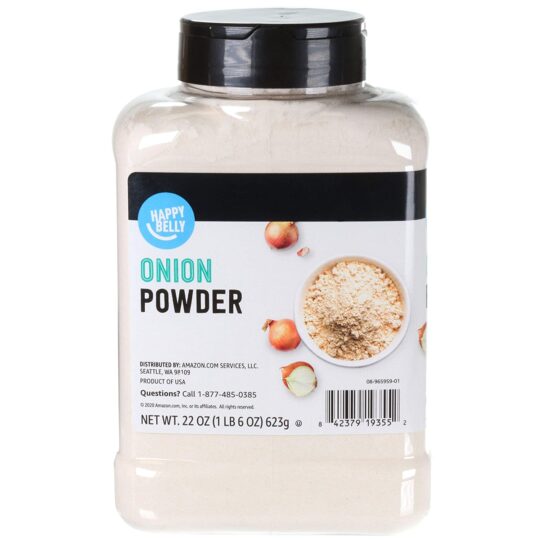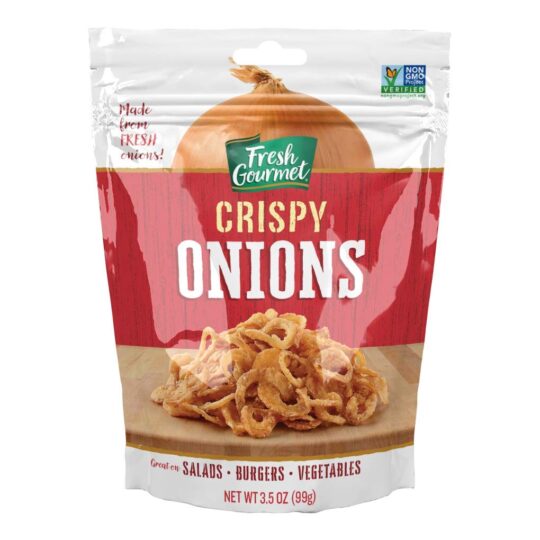One ingredient considered a practical cooking staple is dried minced onions. Dried onions serve as an ideal method to add a strong, sweet onion flavor to any recipe without the time-consuming peeling and chopping process or the discomforting watery eyes that come with it. They’re also fantastic for folks who don’t particularly like a strong representation of onions in their meals.
If you’ve ever witnessed the convenience of dried minced onions in making your recipes, cooking without them may seem like the most terrible idea. But in the case of a culinary emergency where you don’t have any dried minced onion on hand, you might not have any option but to seek a suitable substitute.
Take a look at the options we have suggested in this article next time you’re looking to replace dried minced onions in your recipes.
Onion Nutrition Facts

What are dried minced onions?
Dried minced onions are essentially still onions, but to achieve the form they present, they undergo a bit of processing. It all starts with whole white onions that have been plucked at their height of flavor. The onions are peeled and carefully dehydrated to maintain as much of their crisp and deliciously flavorful quality as possible.
Typically, dried minced onion must be rehydrated by soaking it in water before using it in a recipe or allowed to cook sufficiently in a sauce. Dried onion has the same flavor as fresh onion, but it is different. Also, sometimes, even after soaking dried minced onions in a sauce, they may not develop the level of softness you expect. On the other hand, the leftover crunch can lend a pleasant bite to meals when they’re used.
Dried minced onion can be added to various recipes to introduce delicious flavors. Fresh dips and salads, slow-cooked soups and stews, rapid stir-fries and grills, and any stovetop or oven casserole are just some of the many recipes in which they come in handy.
Uses of dried minced onion in recipes
Dried onions are an excellent method to give any recipe a crisp, sweet onion flavor. They can be used anyplace you want to add a little extra flavor, and they have the added advantage of being quick and convenient to introduce into recipes.
Some recipes typically benefit from the inclusion of dried minced onions. Some of them have been highlighted below:
- Parsleyed rice pilaf
- Macaroni salad
- Slow cooker beef stew
- Garlic rice with sauteed onions
- Instant pot beef stew
- Caramelized onion pasta
- Onion soup mix
- Beef and onion stew
- Easy garlic chicken
- Sauteed green beans
- Chicken salad
- French onion chicken
- Salisbury steak with mushroom gravy
- One-pot mince and pasta
- French onion pasta
Substitutes for dried minced onion
Dried minced onion is a convenient staple to have on hand in the kitchen due to its ease in the cooking process. Also, the flavor of onions in recipes is incomparable, and you’ll find that dried minced onions will always find a way to make your meals taste infinitely better.
Inevitably, however, you may one day run out of this kitchen staple, and in that case, it is necessary to consider the use of available substitutes. You could experiment with one of these replacement options we have highlighted below.
Onion powder

For those who prefer the flavor of onion but don’t want bits of onion in their meal, onion powder works like an excellent solution. Onion powder comes in various flavors, sweet and raw, while others are toasty and earthy.
When substituting onion powder with dried minced onions, it is important to use the appropriate amounts. 1 tablespoon of dehydrated onion typically equals one teaspoon of onion powder and ½ teaspoon of powder equals ¼ cup of freshly chopped onion. Keep this in mind for the best results.
It is very easy to introduce onion powder in place of dried minced onions. On recipes such as roasts, baked fish, and salad dressings, you can simply sprinkle onion powder straight from the shaker.
Fresh onions

When your recipe calls for dried minced onions, and you don’t have any, you can simply use some fresh onions in their place. This works because dried minced onions are essentially made from fresh onions, so you’ll just get a fresher flavor in your recipes.
Because dried onions have a milder flavor than fresh onions, you would need to adjust your recipe if you use fresh, minced onions instead of the dehydrated version. One cup of chopped, fresh onion typically equals ¼ cup of dehydrated onion, and one teaspoon of dried, minced onion equals one small onion.
Frequently asked questions (FAQs)
Are minced onions and chopped onions the same?
A: Typically, with both forms, you’ll be aware of the presence of onions in your meal because you’ll taste them, but the difference is that you won’t get enormous chunks in every bite. Onions that have been minced areas are typically small as they can be. Chopped is a more broad term that simply refers to cutting onions less precisely than when dicing or mincing them.
Is dried minced onion the same as onion powder?
Although both started as fresh onions, dried minced onion and onion powder are not the same, so note this. It is also important to know how much each is to replace fresh onion; otherwise, your finished meal would be swamped with an onion flavor.
Is diced and cubed the same?
Cutting food items into pieces that aren’t always even but are all around ½-inch in diameter is referred to as “chopping.” “Cubing” refers to cutting food into even pieces, like a square. “Dicing” refers to cutting food into thin, even squares around ¼-inch thick in diameter.
Conclusion
Onions are flavorful, aromatic vegetables that offer savory recipes a rich, well-rounded aroma and flavor. Onions are typically available in various forms, and the dried minced variations are a handy item to have on hand, especially when fresh onions aren’t accessible.
If you don’t have dried, minced onions on hand, there are likely other excellent substitutes in your spice rack that will replicate their effects in giving your recipes a delicious, spicy quality. Simply experiment with one of our suggested substitutes to get the best results with your cooking.
